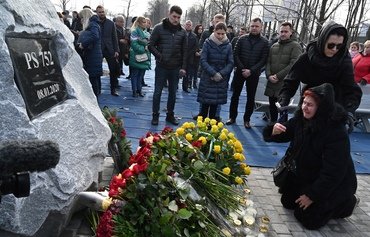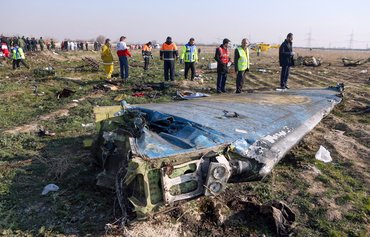Iran pledged Wednesday (March 11th) at a UN civil aviation meeting to hand over black boxes from downed Flight 752 to Ukraine or France for analysis -- a move welcomed by Canada and Ukraine.
Iran's representative at the International Civil Aviation Organisation in Montreal, Farhad Parvaresh, said the devices would be sent to Kiev, sources confirmed to AFP.
They are expected to contain information about the last moments before the Ukraine International Airlines jetliner was struck by a missile and crashed shortly after taking off from the Tehran airport on January 8th.
In Ottawa, Canadian Foreign Minister François-Philippe Champagne "welcomed" Iran's commitment to finally share the black boxes, saying this was "a step in the right direction by Iran".
"I take Iran at their word," he said, "but I would rather judge their actions once the black boxes are in Europe and we have our own experts who have been able to analyse (them)."
Ukraine's ambassador to Canada, Andriy Schevchenko, in a tweet said his country also "welcomes Iran's decision" to hand them over, adding that "if additional expertise is needed", the flight data recorders would be forwarded to France for analysis.
Iran has admitted that the two black boxes were damaged and that it lacked the technical ability to extract data from them, but for two months it has waffled about what to do with them.
Countries whose citizens died in the disaster -- which included mostly Iranians but also Afghans, Britons, Canadians, Swedes and Ukrainians -- had criticised Iran's refusal to hand the plane's black boxes to Ukraine or one of the few countries capable of recovering and analysing the data they contain.
Growing discontent with Iran
Canada repeatedly asked Iran to hand the plane's black boxes over to Ukraine or France for expert analysis.
At the ICAO meeting, Canadian Transportation Minister Marc Garneau stepped up the pressure, saying: "We cannot learn from the tragic shoot-down of PS752 unless all the facts are known and analysed.
"Two months after the fact, we should all be increasingly concerned with Iran's failure to arrange for the readout of the flight recorders despite repeated requests," he said.
"Iran must act now to arrange the readout of the flight recorders as a demonstration of continued willingness to provide a full and transparent account of this event that is consistent with their international obligations. Canadians and the international community simply cannot wait any longer."
The ICAO also pressed the Islamic Republic "to conduct the accident investigation in a timely manner" in compliance with international accident investigation provisions.
The disaster unfolded as Iran's defences were on high alert in case the US retaliated to Iranian strikes hours earlier on American troops stationed in Iraq -- which were themselves in response to the US assassination of top Iranian commander Qassem Soleimani.
In the immediate aftermath, Iranian civilian authorities insisted the crash was likely caused by a technical malfunction, vehemently denying claims the plane was shot down.
But in the early hours of January 11th, the Iranian military admitted that the plane was shot down due to "human error", killing 176 people, as Iranian protestors vented their anger over the catastrophic blunder.

![Relatives of the 11 Ukrainians who died in a plane mistakenly shot down by Iran in January, react during a ceremony unveiling a memorial stone at the site of the future monument at the Boryspil International airport outside Kiev on February 17th. [Sergei Supinsky/AFP]](/cnmi_am/images/2020/03/12/22964-iran-ukraine-jet-600_384.jpg)






